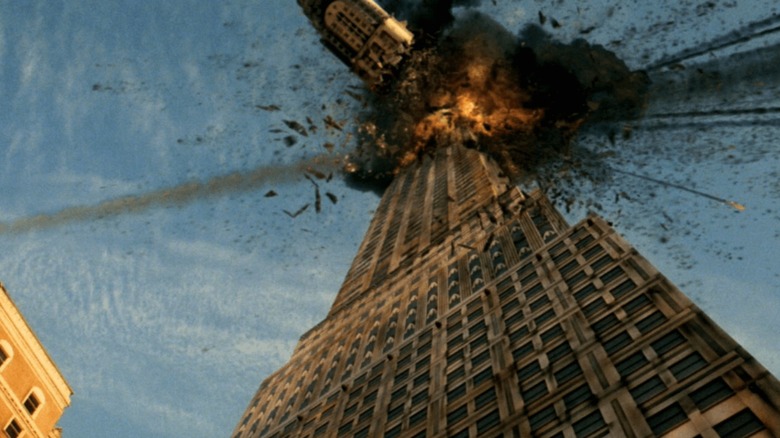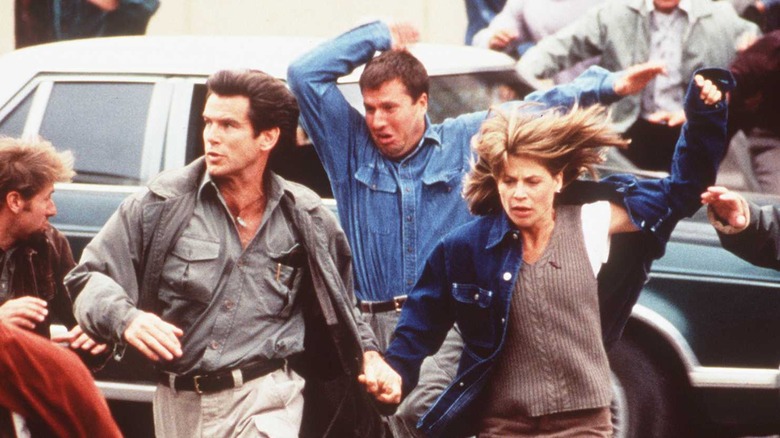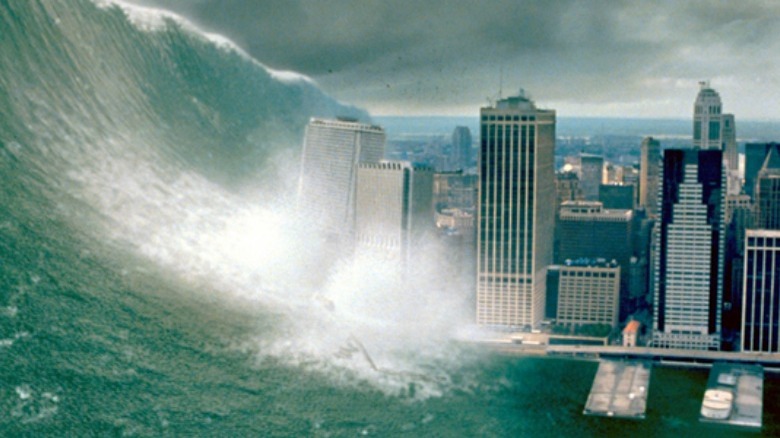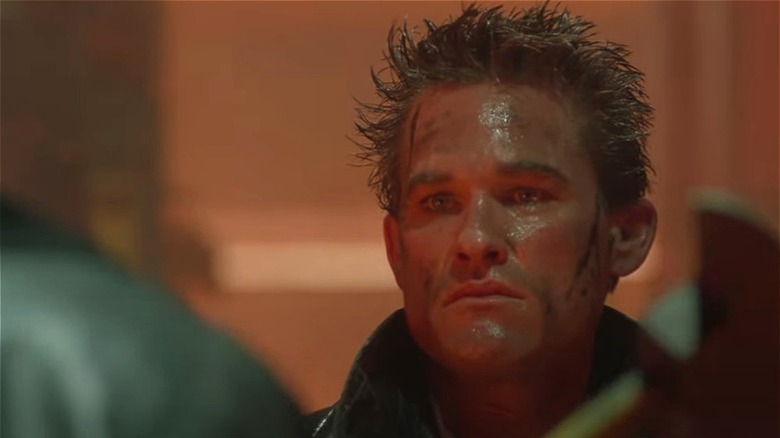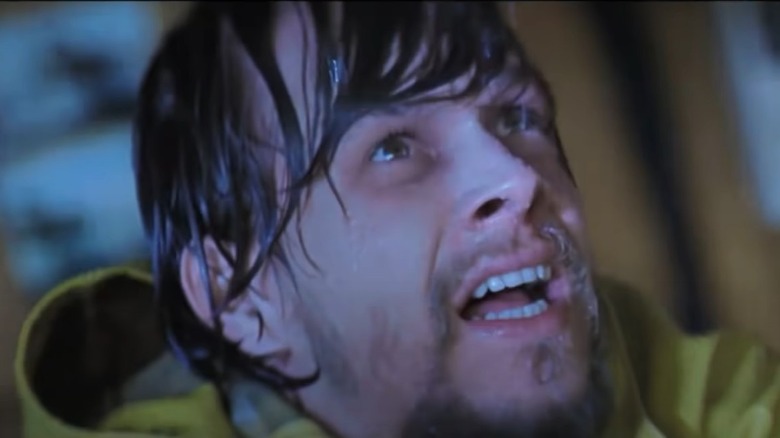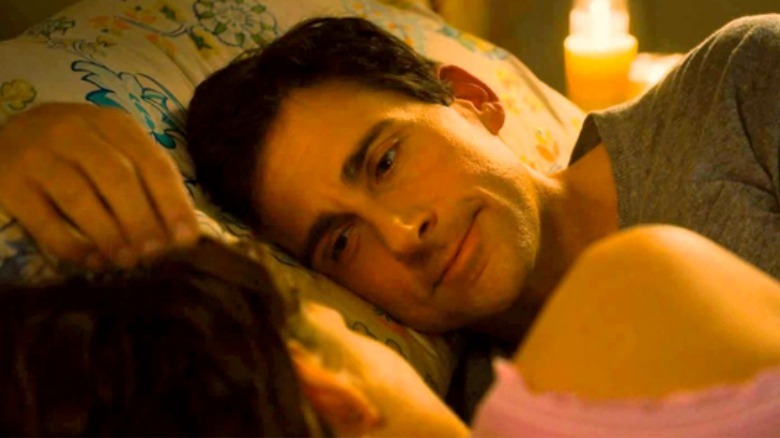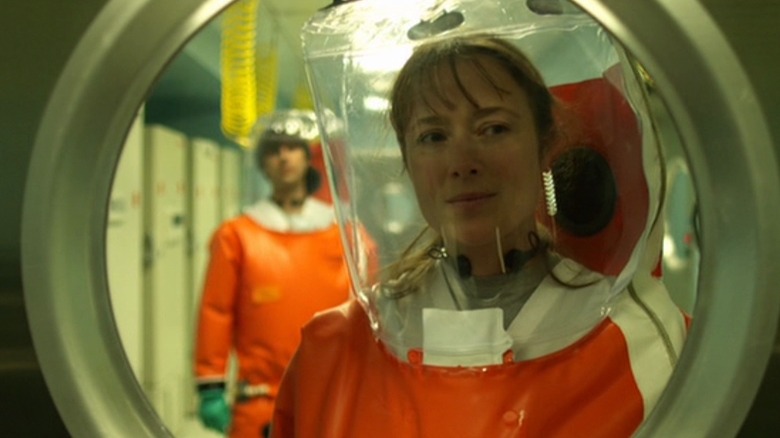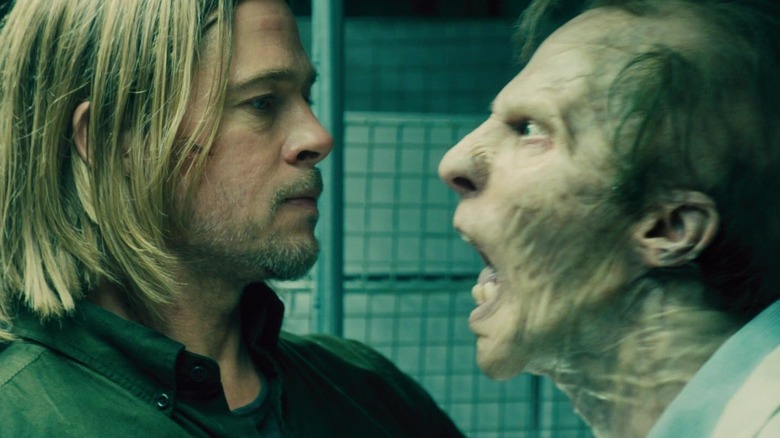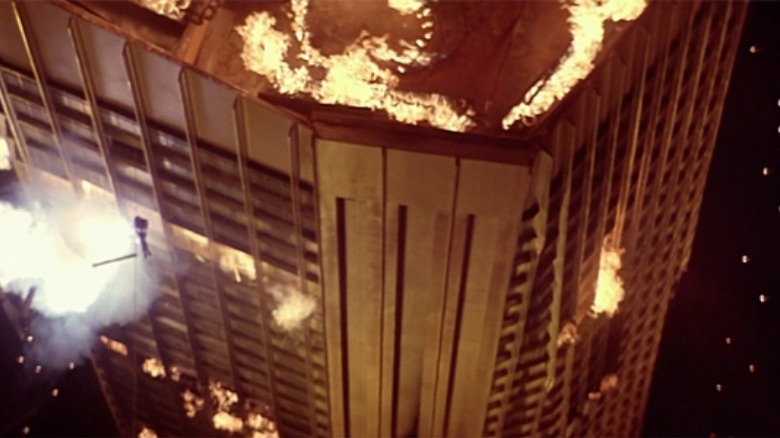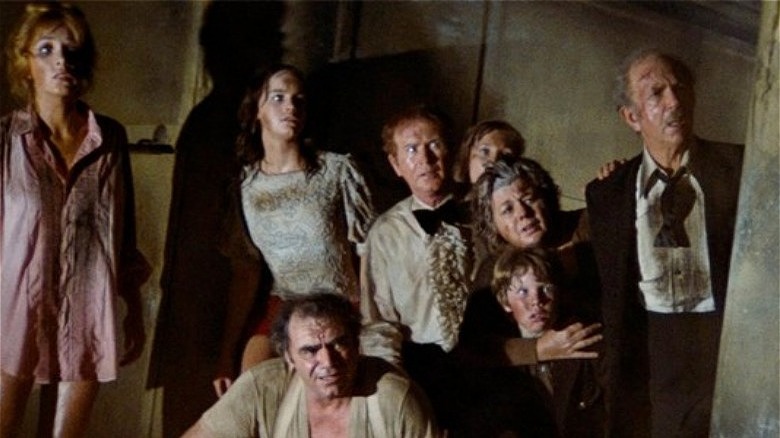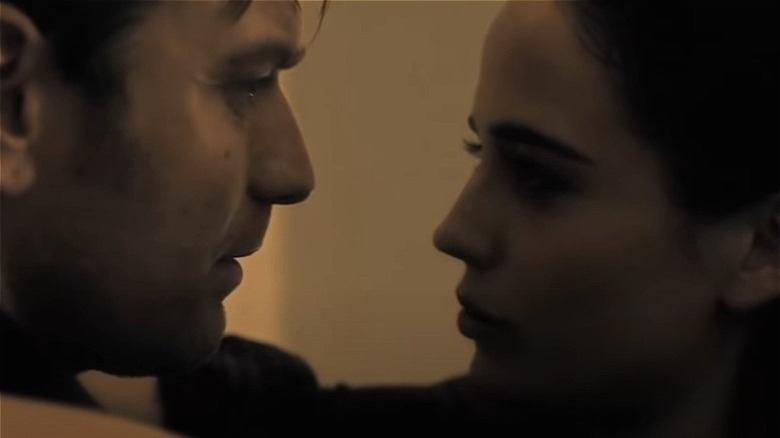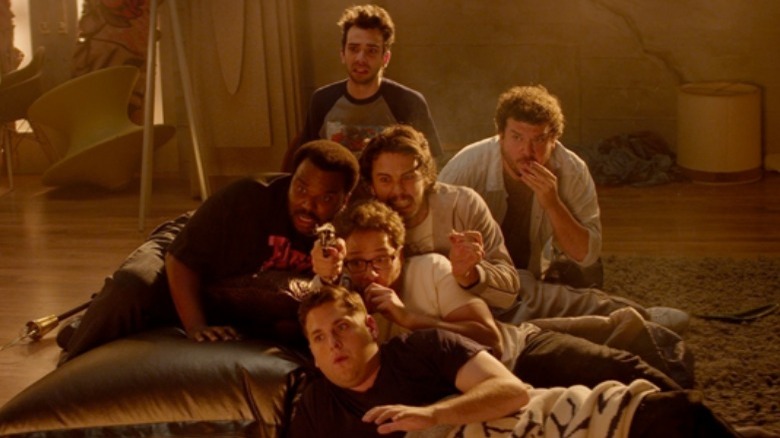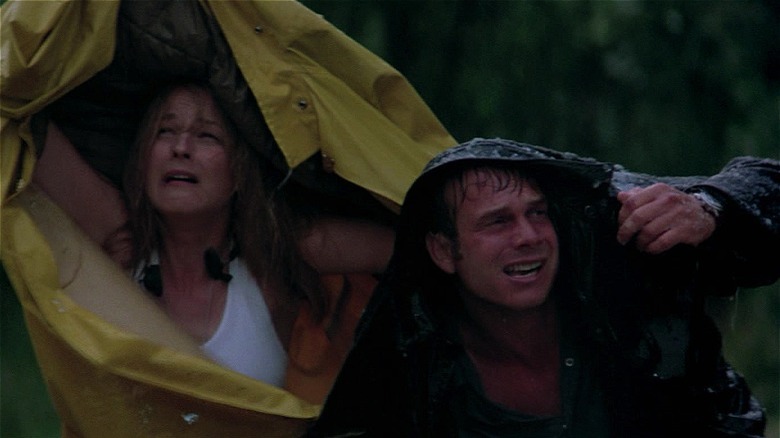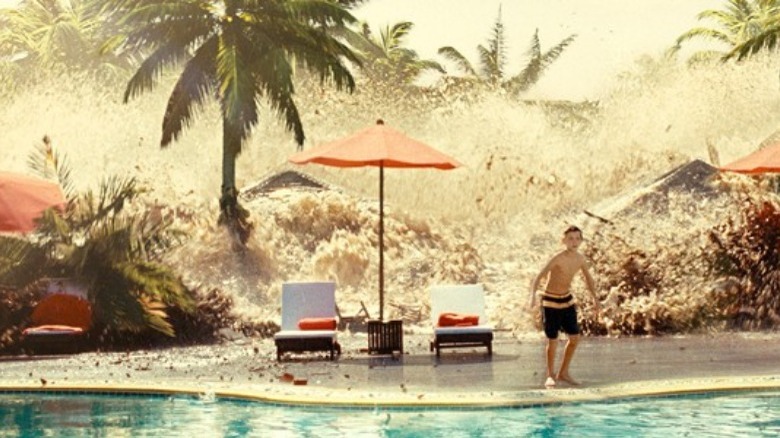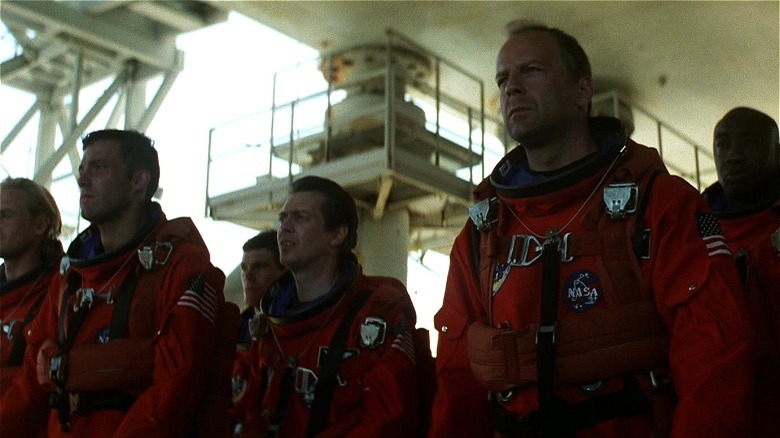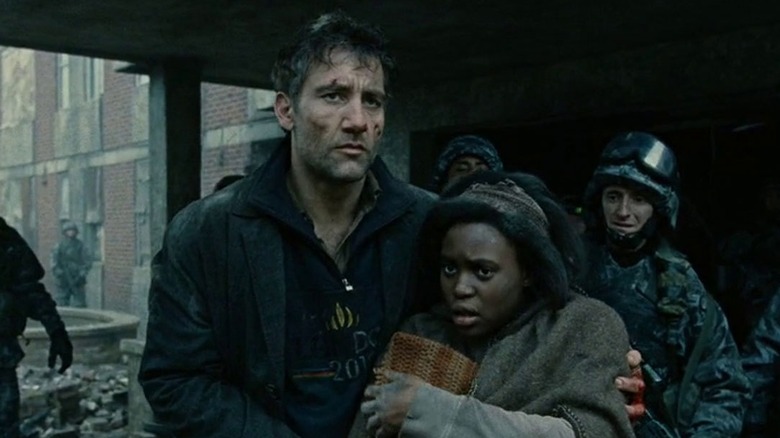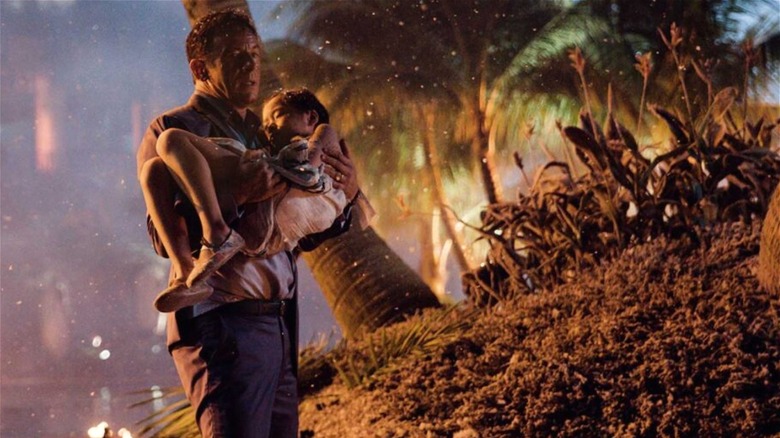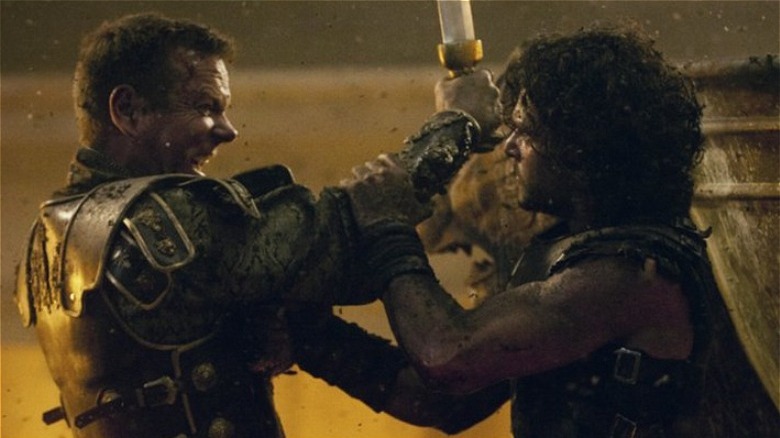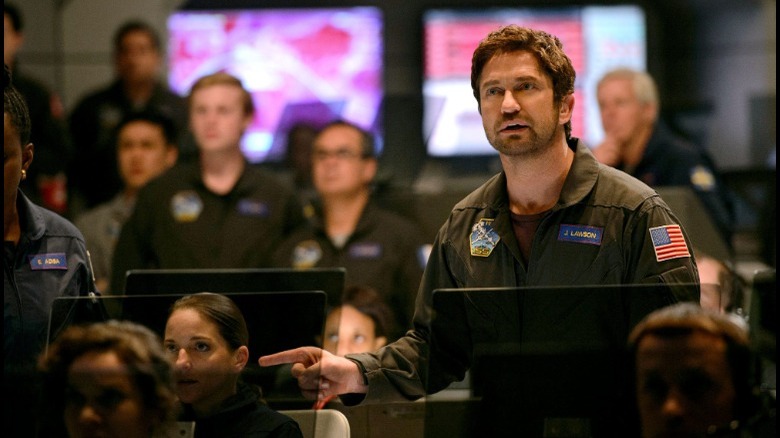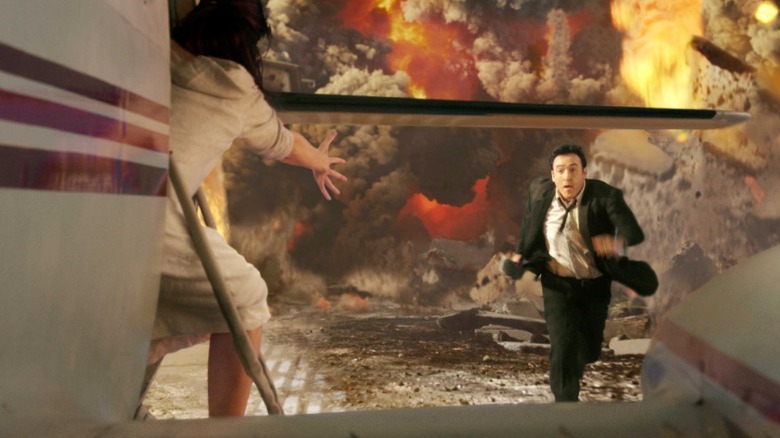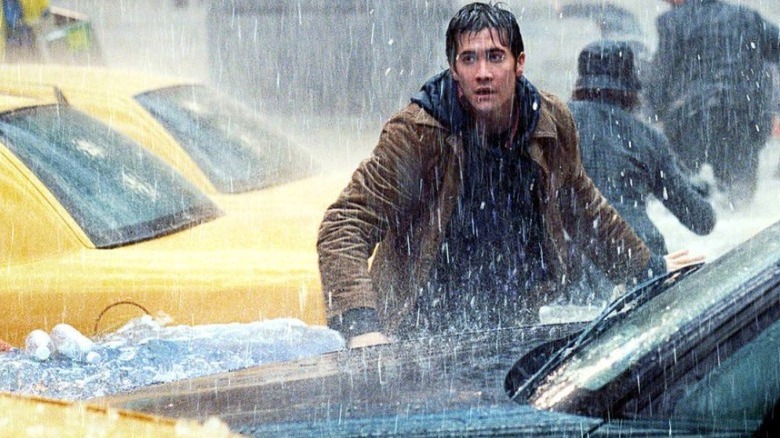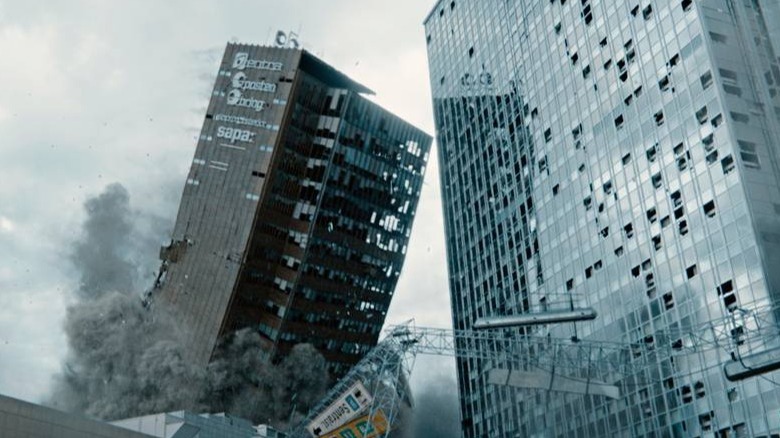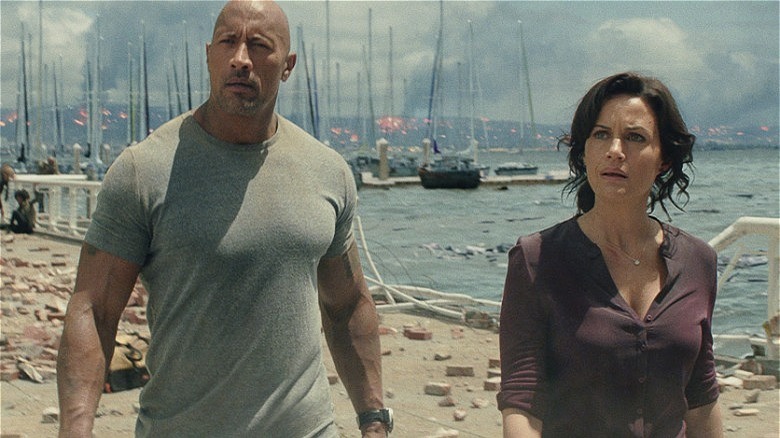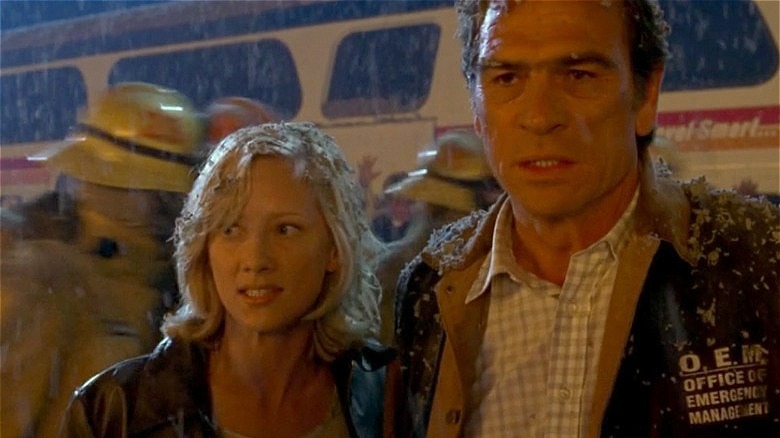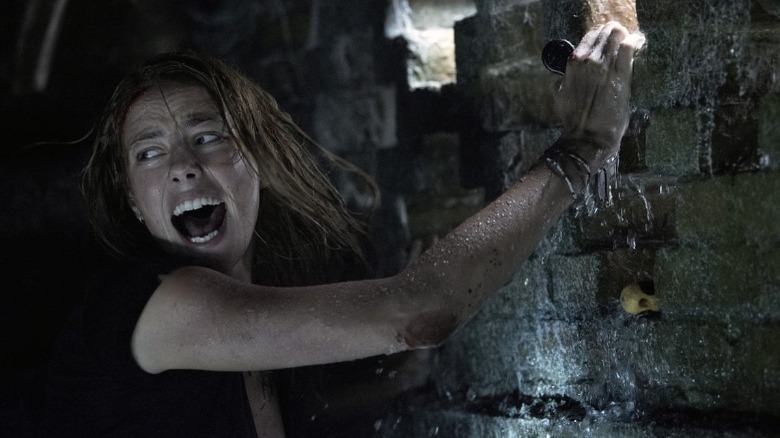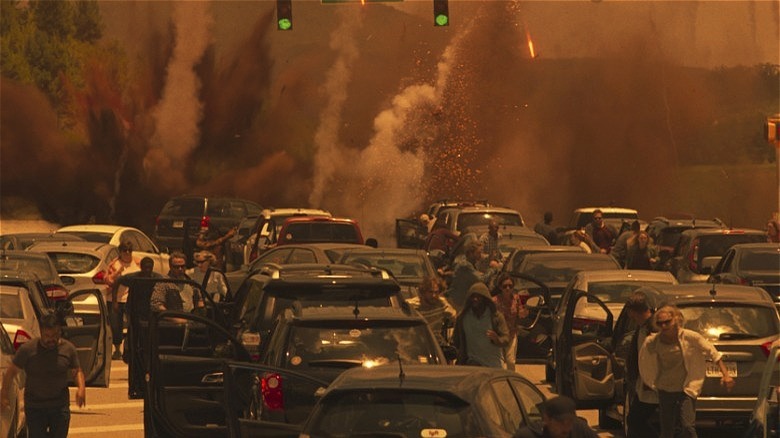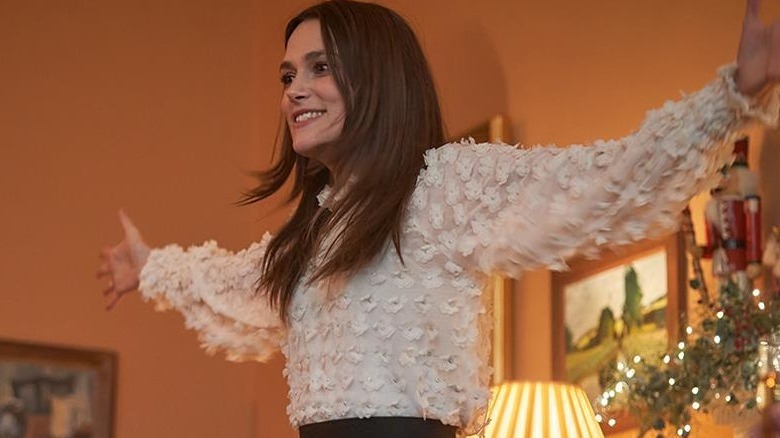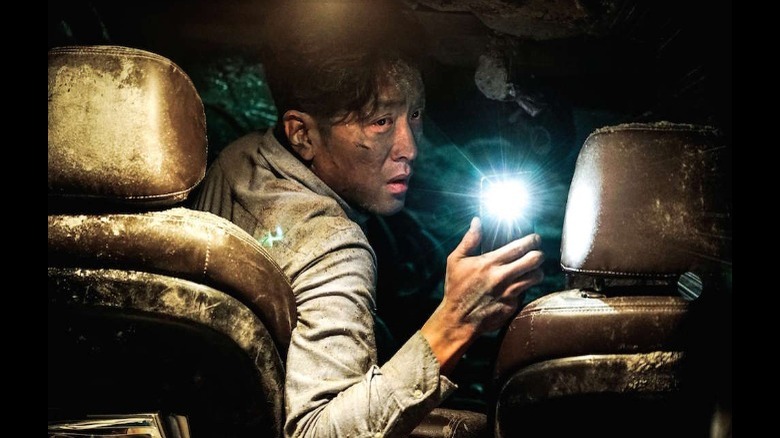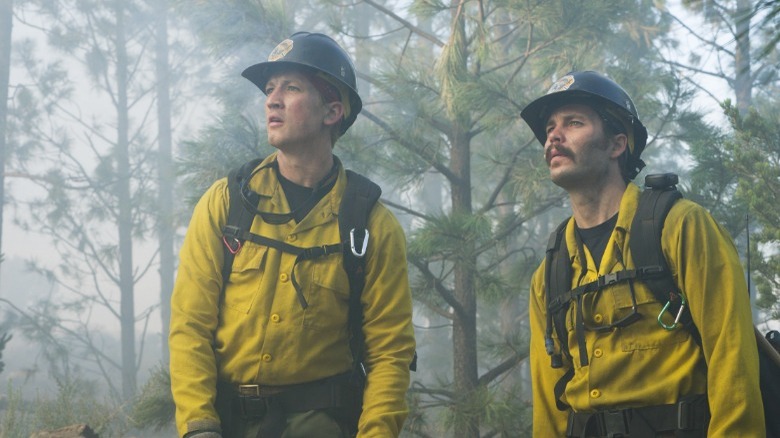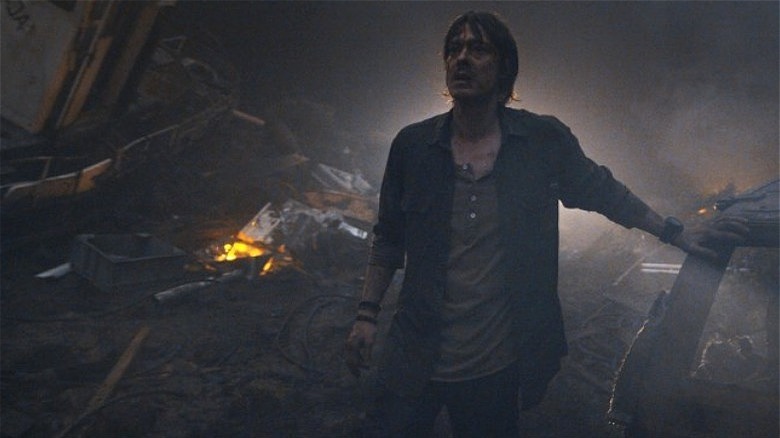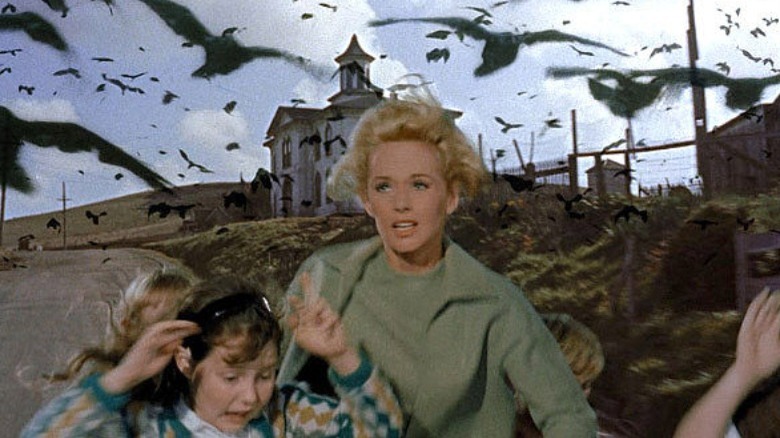Top 30 Best Natural Disaster Movies
Volcanoes, fires, tidal waves, epidemics, tornadoes, and asteroids, oh my! So many natural disasters. So many natural disaster movies. Please join us as we look back at 30 of the best natural disaster movies.
If you're compiling your own list in your head, however, keep in mind that we're counting down natural disaster movies. That means, for example, you won't find any movies about monsters attacking cities. We're looking at you, "Godzilla" and "Cloverfield." Or, we're not, actually. And we've also chosen to exclude alien invasion flicks that feature plenty of destruction, such as "Independence Day" and "Mars Attacks!" and also transportation or vehicle-centric disasters, among them "Titanic" and "Apollo 13." And finally, movies where a disaster has already struck, such "Mad Max" or other post-apocalyptic flicks, don't count either.
Without further adieu, let's count down the Top 30 Best Natural Disaster movies after the jump.
Dante's Peak
Pierce Brosnan, between a couple of his James Bond adventures, found time to try and save a small town from a volcano long thought to be dormant. Spoiler alert: It's no longer dormant! And who better to be teamed up with than Sarah Connor herself, Linda Hamilton, who plays the mayor of the movie's titular Washington town. This was one of two competing volcano-based action thrillers released in 1997, the other being the aptly titled "Volcano," which featured an eruption in the heart of Los Angeles and a cast that included Tommy Lee Jones, Anne Heche, and Don Cheadle.
Despite not having Jones, Dante's Peak is a much superior disaster film thanks to some pretty intense and brutal moments, including a steaming lake burning a grandmother to death and Brosnan's character suffering a compound fracture. Director Roger Donaldson makes it all feel and look real, and Brosnan and Hamilton, as well as countless fleeing/screaming extras, sell the terror of trying to outrun molten lava.
Deep Impact
Hollywood just loves doubling up on similar ideas, and here's one of the world-ending asteroid movies that hit the big screen in 1998. The other one is better, but we'll get to that eventually. Though fairly melodramatic, "Deep Impact" leverages an impressive ensemble cast to show what an end-of-the-planet scenario might look like if the world's governments made an effort to salvage the population — or some of it. And while all that activity happens on Earth, there's a team in space trying to stop it too.
The real wow factor comes when a smaller asteroid hits Earth and causes some serious destruction, long before Roland Emmerich shook up the planet with "2012." Also, it's hard to go wrong with Morgan Freeman as the president, which was back when having a Black president in a movie was an easy way to remind audiences that we were in the future. If we ever have to deal with an asteroid impact of this level, I hope Morgan Freeman gives all the speeches to the American people as we recover.
Backdraft
I'm not sure why there haven't been more thrillers crafted based around the concept of raging fires, but it would seem to be an untapped source for Hollywood. "Backdraft" rates as one of only a handful of genuinely memorable titles focusing on the dangers of massive fires and the firefighters who try to stop them, and this movie will have you double-checking your smoke detectors before you go to sleep. This one is a bit of a cheat since an arsonist is responsible for the fires, but there just aren't enough fire-related thrillers like this, so it gets a pass and makes our list.
You might not remember, but Ron Howard directed this one back when he was good at helming thrillers such as Apollo 13 and Ransom. The fire sequences are visually and sonically remarkable, and the movie also boasts a pretty fantastic cast that includes Kurt Russell, Robert De Niro, Donald Sutherland, William Baldwin, Jennifer Jason Leigh, Scott Glenn, Rebecca De Mornay, and the late, great J.T. Walsh. Chances are you didn't see the 2019 sequel, "Backdraft 2," which starred Joe Anderson but also included appearances by OG actors Baldwin and Sutherland.
The Perfect Storm
Even though Titanic can't be part of this list, that doesn't mean there aren't some disasters at sea that aren't worth mentioning here. After Mark Wahlberg and George Clooney found gold in Iraq in Three Kings, the two stars headed out to sea on the Andrea Gail, hoping to score a literal boatload of fish during a hard time.
What begins as a fishing expedition turns into a battle for survival as their ship, which also counts John C. Reilly, William Fichtner and John Hawkes in the crew, faces the convergence of two powerful weather fronts and a hurricane. In a way, this movie was far ahead of its time, before shows like Deadliest Catch were all the rage.
Seeking a Friend for the End of the World
There are several films on this list that feature a world-ending asteroid scenario, but this is the only one that uses this setting as a backdrop for a touching story of friendship and love between characters played (beautifully) by Steve Carell and Keira Knightley. "Seeking a Friend for the End of the World" dances a fine line between comedy and drama as we see what happens to society as our time on this planet nears its conclusion.
This is basically the kind of story that happens off-screen while stuff goes boom in something like "Armageddon" or "Deep Impact." Those two movies squeezed in bits of character drama and gallows humor, while "Seeking a Friend for the End of the World" puts the gallows humor front and center. As a result, it ends up being much more emotional and intimate than either blockbuster. Add in a great supporting cast of indie favorites — including Melanie Lynskey, Patton Owsalt, Adam Brody, Derek Luke, Connie Britton, and Rob Corddry — and you've got a criminally overlooked gem.
Contagion
While most natural disaster films threaten us by destroying the planet or our infrastructure, "Contagion" takes aim at humanity as a virus begins to quickly wipe out huge parts of the population. Directed by Steven Soderbergh and released in 2011, "Contagion" is terrifying in and of itself, and doubly so for anyone who dared to watch it during the heart of the COVID-19 pandemic nearly a decade later. The lines totally blur between reality and fiction; if feels almost like a documentary now.
Heightening the tension, Soderbergh deftly balances the clock's-a-ticking medical, military, political, and social races to control and grapple the virus with dramatic moments that explore the heartbreaking toll it takes on unlucky victims — and their loved ones. Oh, and don't forget the conspiracy theorists. They're here, too. And talk about a cast; "Contagion" stars Matt Damon, Gwyneth Paltrow, Laurence Fishburne, Jude Law, Kate Winslet, Bryan Cranston, Marion Cotillard, Elliott Gould, Chin Han, John Hawkes, and Jennifer Ehle.
World War Z
From one epidemic ("Contagion") to another, this global action thriller takes the zombie formula and gives it an interesting twist. Instead of the dead coming back to life, some humans have been infected with a rapidly spreading virus that turns them into flesh-hungry, mindless, but very fast, almost insect-like hordes. Anyone bitten becomes a zombie, but there are some who seem to be immune. Hmmmm, who — and why?
"World War Z" makes this list over several zombie-movie options for a variety of reasons. One, the viral explanation behind the inciting incident is fascinating. Two, it's a terrific adaptation of the horror novel by Max Brooks, the son of comedy legend Mel Brooks. Three, at a time when there were almost too many zombie movies, this one offered something refreshing — and it still does. Four, we're talking about lightning-quick zombies, people. They're just freaky, and a cool spin on the classic lumbering creatures in George Romero's zombie movies.
The Towering Inferno
Here's the first of two prime examples of iconic disaster movies with more than impressive ensemble casts, and it's also one of the rare, quality disaster films that relies on fire as the force to be reckoned with. The film follows a fire that begins raging in The Glass Tower, designed to be the world's tallest building. All this happens during the grand opening of the San Francisco skyscraper, which puts plenty of people in harm's way.
Speaking of which, this movie is packed with the biggest stars of its day: Steven McQueen, Paul Newman, William Holden, Faye Dunaway, Fred Astaire, Robert Wagner, Dabney Coleman, and even O.J. Simpson. Aside from its star-studded cast, "The Towering Inferno" also made Hollywood industry news even before it opened, and that's because it went down in history as the first co-production by two major studios, 20th Century Fox and Warner Bros. Pictures. If you're looking for a classic worth watching, seek this one out.
The Poseidon Adventure
Speaking of classics worth watching, here's another. Now, before you get bent out of shape that this disaster movie takes place aboard a ship, and thus doesn't seem to fit our criteria, keep in mind that the disaster itself is caused by an undersea earthquake, which creates a massive wave that capsizes the SS Poseidon. It seems a little lighthearted to call this movie The Poseidon Adventure, especially when that adventure is described as "hell at sea," but this is also a 1972 film, so there had to be some way to make it sound more exciting than just "Poseidon." And it is an adventure, just not a joyous one.
The film won two Oscars, including one for a score from composer John Williams, after earning eight nominations. An impressive ensemble brings this film to life, including Gene Hackman, Ernest Borgnine, Red Buttons, Shelley Winters, Roddy McDowall, and even Leslie Nielsen, who would go on to spoof disaster films with Airplane! in 1980. For the time, there were some pretty impressive special effects and practical effects (the upside-down set!) used to bring this tale to life. All in all, it's definitely worth a watch.
Perfect Sense
There are countless epidemic-oriented movies out there, and a couple of them have already made it on this rundown, but none are as heartbreaking or original as this one."Perfect Sense" follows a blossoming romance in tough times, as an epidemic spreads across the world, causing people to lose each of their five senses one by one.
That plot synopsis alone tells you this is no traditional natural disaster flick. Expect to see how society begins to slowly crumble as people lose more of their senses. Ewan McGregor and Eva Green are phenomenal in this unique drama that is powerful, engaging, and even sexy at times. But beware, because it's also pretty damn depressing. The film played at Sundance in 2011, but barely reached theaters anywhere in the world. It deserved better. If you can find it on cable or streaming, it'd make "Perfect Sense" to watch it. Oh, and trivia fans may get a kick out of seeing Denis Lawson play the boss of McGregor's character. Lawson, who portrayed Wedge Antilles in the original "Star Wars" trilogy, is McGregor's real-life uncle.
This Is The End
As far as following the rules goes, this entry might be a little controversial as well, but since we made up the rules for this list, we're also allowed to break them! Depending on your beliefs, there's probably no greater natural disaster than the Rapture, so this apocalyptic, raunchy comedy fits perfectly in this line-up. Co-written and co-directed by Seth Rogen and Evan Goldberg, the story follows several celebrities — including Rogen, Craig Ferguson, James Franco, Jay Baruchel, and Jonah Hill, all playing exaggerated versions of themselves — contending with the notion that the end is nigh.
Rogen and Golberg spare nothing. The language is course, the violence over-the-top, and the destruction wanton — and it just gets worse and worse (or better and better, depending on how you look at it), right up until the arrival of the Devil and his big, swingin' dick. Emma Watson practically steals the how, and the many other celebrities who pop in for cameos — among them Rihanna, Michael Cera, Mindy Kaling, The Backstreet Boys, Channing Tatum, Kevin Hart, and Paul Rudd — look like they're having a ball (even when they're getting impaled, swallowed up by the Earth, or eaten by cannibals).
Twister
The late, much-missed Bill Paxton was one of only two actors to be killed by a Terminator, a Predator, and one of the xenomorphs from "Aliens." But mother nature just couldn't get the job done in what is easily the best tornado film ever made. Here, Paxton's storm-chaser character is forced to reconnect with his ex-wife (Helen Hunt) and fellow storm-chaser (Helen Hunt) when the latter's team struggles to send an experimental device into the heart of a tornado in order to learn more about these swirling devils.
At the time, 1996, the special effects were state of the art, and while some of them haven't aged well, this is an impressive, suspenseful film that sparked quite the obsession with tornadoes. The sight of a cow flying through the sky is iconic thanks to this movie, and that's quite an achievement. Plus, this movie benefits from one of our favorite performances by the late Philip Seymour Hoffman, who plays a happy-go-lucky member of Hunt's storm-chasing team, and the palpable, edgy chemistry between Paxton and Hunt.
The Impossible
For the most part, tidal waves and tsunamis have been relegated on the big screen to serving as catalysts for other tragedies, or for just being one of the side effects of an even larger disaster. But this harrowing, true story — directed by J.A. Bayona — puts the tsunami front and center for a major portion of the movie.
The Bennett family — Henry (Ewan McGregor) and Maria (Naomi Watts) and their three young boys (one of whom is played by Tom Holland, making his live-action film debut) — find themselves violently separated while on vacation when a massive wave strikes their resort in Thailand. Watts and McGregor are phenomenal, and what befalls them together and separately will pull the heartstrings right out of your chest. There's something to be said about the amazing visual effects in the film as well, which make the rushing water feel as if it's coming directly at you.
Armageddon
Popcorn movies don't get much better or more entertaining than "Armageddon," a 1998 blockbuster from Michael Bay that bested "Deep Impact" in every way. Sure, having oil drillers learn to become astronauts, instead of vice versa, in order to help stop an asteroid from striking Earth makes no damn sense, and much of the science defies the logic of even the most forgiving or uninformed moviegoer. But still, this is old-school, big-budget, over-the-top, crowd-pleasing Hollywood moviemaking at its finest.
Where to begin? The special effects are out of this world. Trevor Rabin delivers a powerful, exciting, occasionally romantic score, and there was no escaping "I Don't Want to Miss a Thing," the lush, sweeping song written by Diane Warren and performed by Aerosmith. And just look at the cast: Bruce Willis anchors the proceedings, with top-notch support from Ben Affleck, Liv Tyler, Will Patton, Steve Buscemi, the late Michael Clarke Duncan, William Fichtner, Jessica Steen, Owen Wilson, Keith David, and Peter Stormare. And while no one considers Bay a purveyor of comedy, Willis and company score plenty of laughs throughout the film's 151-minute running time. It's pretty damn close to a masterpiece for its genre, and it holds up remarkably well.
Children of Men
In what might be the most slow-moving disaster in this entire line-up, "Children of Men" eliminates the one thing that allows humans to survive great long-term disasters: the ability to reproduce. For 18 years, mankind has been infertile. Chaos reigns around the world and only the United Kingdom can claim a "stable" government. This is a disaster unlike any other — because it's not killing off any people who are already alive, but rather chipping away at their hope for the future, which is almost worse. Even more terrifying: there's no medical solution.
Bolstering the unique premise, director Alfonso Cuaron ("Gravity") makes this film a must-see, literally, for its stark visuals. Several single-shot sequences are positively mind-blowing (and predecessors to what Alejandro Gonzalez Intarritu would accomplish with "Birdman"). Clive Owen, as the story's reluctant hero, gives easily the best performance of his career to date, and the esteemed Michael Caine (as a flatulent drug dealer) deserved an Oscar nomination. Despite stellar reviews, "Children of Men" actually lost money at the box office. If you've never seen it, seek it out.
Skyfire
Simon West's "Skyfire" is "Jurassic World: Fallen Kingdom's" entire first act stretched to feature length. It's a big, brazen, deeply silly disaster movie, the first-ever Chinese disaster feature done on this scale. Filmed in both English and Chinese, both versions are basically the same, since neither really demands all that much of the performers involved. That's not an innately bad thing, either. Sometimes audiences just want big, dumb disaster movies, and "Skyfire" more than fits the bill.
Tianhuo Island experienced a catastrophic volcanic eruption 20 years ago. Wentao Li (Xueqi Wang), a geologist, vowed never to return. Unfortunately, his daughter, Meng (Hannah Quinlivan) is presently working on the island, now a world-famous theme park run by businessman Jack Harris (Jason Isaacs). Everyone converges on the island, and from the start, the audience is introduced to plenty of screensaver beauty, the island's natural vistas inspiring plenty of awe and wonder. Of course, the central volcano will almost certainly erupt again, and when it does, "Skyfire" lives up to its title. What it lacks in characterization and logic it more than makes up for in simple, big-budget thrills. The sky literally rains fire, waves of lava crash over unsuspecting tourists, and everyone just barely dodges plenty of threats as they endeavor to escape. It's not going to endure, but for fans of silly disaster features, "Skyfire" knows how to honor convention.
Pompeii
In 2014, Paul W.S. Anderson's "Pompeii" grossed just $117 million worldwide against a reported $100 million budget. Those are grim figures. They're not "Cutthroat Island" grim, though as an early augur for the decline of disaster movie reliability, it was as clear a signal as any. Audiences, on account of shifting viewing habits and tastes, just don't flock to disaster movies like they used to. Especially when the likes of the Marvel Cinematic Universe can deliver the same destructive scale with considerably more heart and fan fealty. It's what makes the likes of "Greenland" so refreshing, and while "Pompeii" isn't "Greenland," it's a flop that's considerably more fun than it had any right to be.
A sort of "Gladiator-lite," Anderson's "Pompeii" stars "Game of Thrones" actor Kit Harington as Milo, a young gladiator whose interpersonal dealings with Cassia (Emily Browning) feel kind of silly when Mount Vesuvius erupts and fireballs descend upon the city. While Anderson saves most of the destruction for the end, the embellished-though-no-less-fascinating look at Pompeii's destruction is both cinematically rewarding and historically compelling.
Geostorm
Audiences would be forgiven for thinking "Geostorm" was the handiwork of one Roland Emmerich. It's not. Dean Devlin, a longtime writer-producer for Emmerich's films, made his directorial debut with this 2017 end-of-the-world disaster flick. Disaster movie mainstay Gerard Butler stars as Jake Dawson, the chief architect for a series of satellites, dubbed "Dutch Boys," capable of neutralizing extreme weather patterns on Earth. Giant tsunami? Just have the Dutch Boys take care of it. In conventional disaster-movie fashion, Lawson is disgraced. Jumping forward a few years, a scourge of malfunctioning satellites has created the titular geostorm. Rather than stopping threats, the satellites are creating them.
Audiences loved it, of course. Sure, it was ridiculous, following every disaster movie beat to a tee, but that didn't stop moviegoers from eating up the heaps of computer-generated destruction thrown their way. Still, alongside Emmerich's own 2022 output, "Moonfall," Devlin's "Geostorm" might have started the wave, no pun intended, of disaster movie flops. With a worldwide cumulative gross of $221 million, "Geostorm" didn't turn a profit, likely accounting for Emmerich's need to independently fund "Moonfall" years later. Just as the world ends, so too does the heyday of disaster flicks with theatrical legs.
2012
While Mayan scholars contended that Western audiences wildly misinterpreted the Mesoamerican Long Count calendar, one that pointed to December 21, 2012, as the seeming end of the world, that didn't prevent an entire generation from believing, whether earnestly or not, that the world would be over by 2012. "Glee" dedicated an entire episode to the phenomenon. The National Geographic Channel offered an entire slate of post-apocalyptic programming for doomsday viewers. Obviously, the world didn't end, though audiences worldwide were still left with one delicious artifact from the time — Roland Emmerich's "2012."
Arguably the most famous doomsday adaptation, Emmerich's 2009 fictionalized account of the world ending sees an incredulous John Cusack leading his family to safety as everything collapses around him. There are mega-tsunamis, earthquakes, and plenty of questionable physics as computer-generated denizens fall to their doom while Cusack's Jackson Curtis and company just barely dodge death time and time again. Like most of Emmerich's output, "2012" prioritizes spectacle over character, and while it's blatantly illogical, few filmmakers can capture mass-scale destruction quite like him. Who needs science when you can just have Yellowstone burst?
The Day After Tomorrow
Moviegoers love disaster movies, but Western audiences especially don't seem to take such epics' core messages to heart. Roland Emmerich's "The Day After Tomorrow," arguably the most famous disaster movie of the early aughts, isn't an especially serious film. It wants to be, what with all the brooding familial conflict, professions of love, and last-minute sacrifices. It can't resist its own destructive scale, however, consistently sacrificing pathos for more popcorn thrills. There's some merit to that. Better still, despite the rocky science, there's a pretty conspicuous and compelling message at its center: climate change is killing the planet.
Dennis Quaid stars as Jack Hall, a paleoclimatologist who, like his disaster movie peers, predicts a cataclysmic event no one believes will happen ... until it's too late. Hall suspects from his research that the shifting climate is liable to create another ice age, and sure enough, it does. Before then, though, it sends the planet's weather into overdrive. There's giant hail, California tornadoes, and plenty of New York tsunamis to wash away taxicabs and pedestrians. "The Day After Tomorrow's" science is there for fun and destruction, though in the years since release, it's been rendered strangely sobering, a reminder of how fragile and delicate the planet really is. That recognition might take some of the fun away, but in its place is plenty of somber contemporary gravitas.
The Quake
Three years after "The Wave," director John Andreas Andersen returned with the much loonier, though no less engaging, sequel "The Quake." The surviving cast of "The Wave" returns for a disaster movie redux. Once more, Kristoffer Joner's Kristian Eikjord predicts mass destruction. This time, Kristian is estranged from his family, who are now living in Oslo, following the events of the first film. While his actions have been celebrated by many, others still consider him a doomsday kook, someone seeing cataclysmic devastation where there isn't any. Here, he begins to read seismic activity around Oslo, convinced that an earthquake is poised to occur any day.
Of course, Kristian is right. Not only that, but as mentioned, his entire family currently resides in Oslo (the Eikjord family has terrible luck). "The Quake" certainly strains credulity more than the first, par for the course in trying to franchise a singular disaster movie. It's the "Scream" of natural disasters, really, and Kristian is the Sidney Prescott. Disaster will follow him everywhere. Still, like Uthaug, Andersen has a knack for staging CG mayhem with a distinct sense of realism. For all the plot contrivances, the quake itself is liable to leave audiences breathless, both in scale and sheer ruination. The tension is no less palpable, and unlike the initial go-round, this time there are real stakes for the surviving players. While it's not "The Wave," it's about as good as any sequel to that was going to be.
San Andreas
While Dwayne Johnson's "Black Adam" might have taken an exhausting several years to get off the ground, that same delay doesn't apply to his many deeply digital summer blockbusters, especially disaster movies. For a while, it seemed like every summer brought another Johnson-led disaster vehicle, one where he'd perform incredulous stunts, banter with some supporting players, and exhibit the requisite pathos when the movie called for it. "Skyscraper" might be a cheap riff on South Korea's "The Tower" (itself a riff on "The Towering Inferno") but it works well enough. "Rampage" isn't one of the greatest video game adaptations, but it's got a stacked cast and plenty of monster mayhem. Then, of course, there's "San Andreas," easily the best entry on Johnson's disaster flick resume.
Johnson stars as Ray Gaines, a Los Angeles helicopter rescue pilot, in Brad Peyton's compelling Roland Emmerich homage. When the titular San Andreas fault erupts, it's absolute mayhem. There are collapsing skyscrapers, shattered dams, and even a tsunami in the San Francisco Bay. All the while Gaines endeavors to rescue his family, including daughter Blake (Alexandra Daddario) and ex-wife Emma (Carla Gugino). Does it make much sense? No. Is it an absolute blast? No doubt about it.
Volcano
Oh, the age-old "Volcano" versus "Dante's Peak" debate. Both have their merits and a qualified, committed cast, and both are about as old-fashioned as a 1990s disaster movie could be. While "Dante's Peak" released first, "Volcano" does have it beat in one key area: the visual effects. With a combination of miniatures, computer imagery, and staging, "Volcano" is the rare disaster movie with both scale and an undercurrent of realism. While the VFX especially stretch credulity at times, "Volcano" holds up remarkably well. There's a fire in here, and it's looking to ignite.
Tommy Lee Jones stars as Mike Roark, the director of Los Angeles' Office of Emergency Management. As is always the case, he predicts disaster, namely the impending formation of a volcano in the La Brea Tar Pits. And as is also always the case, no one takes Mike seriously until it's too late. Soon enough, all of Los Angeles is up in flames as lava races through the streets. "Dante's Peak," on the other hand, might have "Volcano" beat in terms of set pieces, tension, and character development, though "Volcano's" lava-spewing destruction is the more visually engaging of the pair. It's the kind of cinematic scale that reminds audiences of how uniquely powerful the movies are in terms of their power to transport and inspire, and, yes, to destroy.
Crawl
"Crawl" isn't a conventional monster movie. For starters, like the unsung gem "Burning Bright," "Crawl" augments its toothy thrills with a Category 5 hurricane. Most conspicuously, though, it's got French Extremist progenitor Alexandre Aja behind the camera. Aja, best known for both "High Tension" and the considerably-more-brutal remake of Wes Craven's "The Hills Have Eyes," is no stranger to gruesome, Grand Guignol thrills. "Crawl" is brutal. While a sequel remains a possibility, audiences will always have what is arguably the scariest alligator movie ever made.
Kaya Scodelario stars as Haley Keller, a University of Florida swimmer (that's important later) who drives into the eye of the storm to check on her father, Dave (Barry Pepper). Dave is unresponsive in the house's crawlspace, though the storm and his condition are the least of their worries. Stalking the house is a pack of hungry, hungry alligators. Aja makes fantastic use of both Scodelario's "Maze Runner" physicality and the swelling storm to stage several nail-biting set pieces. While it's more monster movie than disaster movie, the hurricane is as much a threat as the monstrous beasts outside. "Crawl" is truly one-of-a-kind, a unique merging of disaster movie scale with intimate, bloody creature-feature horror.
Greenland
No different than Dwayne Johnson, "300's" once up-and-comer Gerard Butler has settled into a reasonable routine of schlocky, big-budget disaster outings. There's "Geostorm," of course, which while fun, is strictly by-the-books. Then there's Ric Roman Waugh's "Greenland," a movie whose trailers yielded no promise. Once again, Butler was going to be thrust into the middle of an apocalyptic event. The effects didn't look great, and a COVID-19 delay should have relegated "Greenland" to the realm of pandemic cinematic casualties (see: "The Empty Man"). Yet, like the latter, "Greenland" transcended convention, a movie with bad marketing that is considerably, considerably better than it should have been.
Butler stars as John Garrity, an instructional engineer who, along with his family, is given priority shelter just as an interstellar comet is set to collide with earth, all but certainly destroying the planet. With a stripped-down approach and an eye for human-level terror, "Greenland" eschews the scale of its peers for something more personal and, thus, terrifying. There are kidnappings, close calls, and plenty of teary monologues as Butler and company grapple with the forthcoming end of the world. It's not a masterpiece, but it's arguably the strongest Western disaster movie of the last 10 years. Plus, with a sequel confirmed, there's no better time to get familiar with "Greenland."
Silent Night
Camille Griffin's debut feature, "Silent Night," is deceptively dark. Billed as a black comedy and boasting a cast — Keira Knightley, Annabelle Wallis, and Lucy Punch are among the esteemed crop of performers — that can deliver the goods, it takes a while for audiences to catch up with exactly what Griffin is planning. Resultantly, "Silent Night" emerges as one of the best feel-bad Christmas movies ever. An apocalyptic disaster movie with bite, this one lingers.
Knightley stars as Nell, a well-off woman who, along with her husband, Simon (Matthew Goode), hosts a Christmas gathering for family and friends alike. This isn't a normal gathering, however. That night, everyone there plans to die by suicide together on account of a poisonous cloud of gas sweeping the globe, killing everything with whom it comes into contact. To combat what is ostensibly a slow, painful death, the government hands out euthanasia pills, and pretty much the entire population is on board. Well, everyone other than Art (Roman Griffin Davis), Nell's oldest son (and the son of director Camille Griffin). While the ending calls to mind "The Mist" more than a decade before, "Silent Night" is nonetheless a grim exploration of science versus faith, family versus society, and the gaseous purple skies spelling doom.
Tunnel
Kim Seong-hun's "Tunnel" is among the best disaster movies too few audiences have seen. This South Korean import stars Ha Jung-woo as Lee Jung-soo, a car salesman trapped beneath the rubble of a tunnel collapse as he drives through it on his way home from work. Miraculously, Jung-soo survives alongside a handful of others. At first, the public is on his side as the South Korean government launches a rescue operation. As the weeks move on, opinion split — the chances of a successful rescue are slim, and all the time spent trying only delays construction on another nearby tunnel.
Seong-hun, like his contemporary Bong Joon-ho, has no qualms about adroitly interrogating the perceived incompetence of his own government. In many ways, "Tunnel" is the public infrastructure sequel to Joon-ho's "The Host," a piercingly funny yet simultaneously distressing portrait of singular persons let down by a self-aggrandizing bureaucracy. Bae Doona is sensational as Se-hyun, Jung-soo's wife, one of the few people (understandably) committed to the rescue, even when all hope seems lost. While "Tunnel" doesn't have the scale of its disaster movie brethren, it's uncommonly human, fiercely funny, and oh-so deliciously infuriating as it interrogates the innate ineptitude of the bureaucrats supposedly there to help.
Only the Brave
Joseph Kosinski's "Only the Brave" is adapted from the true story of the Granite Mountain Hotshots, a group of firefighters who lost their lives while combating the Arizona Yarnell Hill Fire in June 2013. On the surface, "Only the Brave" looks like it would leak machismo, the kind of movie dads get together to screen on the weekends with little audience relevancy beyond that. Yet, with Kosinski (of, yes, "Top Gun: Maverick" fame) at the helm and a strong cast, "Only the Brave" is arguably the greatest wildfire movie ever made. And it's not even close.
Josh Brolin stars as Eric Marsh, a fire and rescue superintendent committed to certifying his ragtag team of firefights as hotshots, the groups that combat large forest fires both regionally and nationally. The early goings straddle disaster movie pathos with the mechanics of workplace comedy, the crew incapable of getting it together when it counts most. As it progresses, however, Kosinski surreptitiously imbues "Only the Brave" with a heartbreaking inevitability. Most of these characters, at some point, will die. A tearjerker in the purest form, "Only the Brave" eschews familiarity with its firm commitment to character, the real story, and some of the most breathtaking (and terrifying) forest fire footage around.
The Wave
While American disaster movies struggled to find their place in an ever-changing cinematic landscape, Norwegian director Roar Uthaug (of the fantastic "Cold Prey" slasher series) thrust himself into the spotlight with a stripped-down disaster flick that puts most everything Hollywood has done this century to shame. Geologist Kristian Eikjord (Kristoffer Joner) is working his final day in Geiranger while his family scuttles about. He has some sensors placed in and around the nearby fjords, and naturally, his readings spell doom. He suspects the Åkerneset crevice is poised to collapse, the result of which will be an enormous tsunami in the fjord, one more than capable of totally obliterating Geiranger.
His colleagues don't take him seriously. Neither do the disaster officials responsible for sounding the alarm. In standard disaster movie fashion, it's Kristian versus the world, until, of course, it's far too late. While the early goings of "The Wave" are admittedly conventional — often, these movies rest on the trope of the protagonist's predictions being incredulously ignored — Uthaug stages the titular wave with more gothic gusto than most. For example, a 10-minute countdown accompanies the race to safety as the wave closes in. It's remarkably tense, and while "The Wave" loses some steam in the aftermath, it's a standout beat. More than that, it's a case study on how to make the fantastic feel very real and urgent.
The Birds
Casual audiences might not know that Alfred Hitchcock's seminal "The Birds" is adapted from Daphne du Maurier's short story of the same name. As the scribe behind the likes of "Rebecca" and "Don't Look Now," it's no wonder "The Birds" is more horror classic, less "Birdemic: Shock and Terror." There's plenty to be said about Hitchcock's own legacy as both person and filmmaker, though independent of that, "The Birds" endures as second only to "Jaws" as the animal attack feature to end all animal attack features.
Tippi Hedren stars as Melanie Daniels, a socialite in San Francisco who makes the trek, as all do, to Bodega Bay to meet a boy (Rod Taylor's Mitch Brenner). While there, the birds absolutely lose it, preventing Melanie from leaving as the denizens of Bodega Bay fight for their lives against flocks of killer birds. Mixing footage of real birds with puppets, the effects don't necessarily stand the test of time, though they don't really need to. Hitchcock's tension is rooted less in the birds, and more in the terror a mere utterance of them can induce. Killer birds might not be a common natural disaster, though it's a scary one nonetheless.
